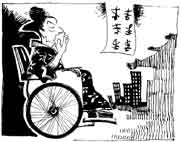Involuntary sterilisations
 more than 16,000 Japanese handicapped women were sterilised forcefully between 1949 and 1995. A health and welfare official admitted that these sterilisations had the approval of the Japanese government. These admissions came after 17 citizens' groups that represent women or the handicapped demanded that the ministry investigate cases of involuntary sterilisation. The government, however, does not plan to apologise or offer compensation to those sterilised or their families. A government official also ruled out an investigation into the sordid affair.
more than 16,000 Japanese handicapped women were sterilised forcefully between 1949 and 1995. A health and welfare official admitted that these sterilisations had the approval of the Japanese government. These admissions came after 17 citizens' groups that represent women or the handicapped demanded that the ministry investigate cases of involuntary sterilisation. The government, however, does not plan to apologise or offer compensation to those sterilised or their families. A government official also ruled out an investigation into the sordid affair.
Over the years, a few Japanese women have publicly claimed that they were sterilised without their consent while housed in public institutions for the handicapped and retarded. However, their voices were never heard, as the domestic media ignored the whole issue. In Japan, where conformity and sameness are highly valued over individuality, people with handicaps, stigmatised diseases like aids , as well as minorities and those from the traditionally unfavoured castes have long been treated as second-class citizens. Even today, handicapped people face discrimination in employment, education and public transport facilities often lack wheel-chair ramps and elevators.
